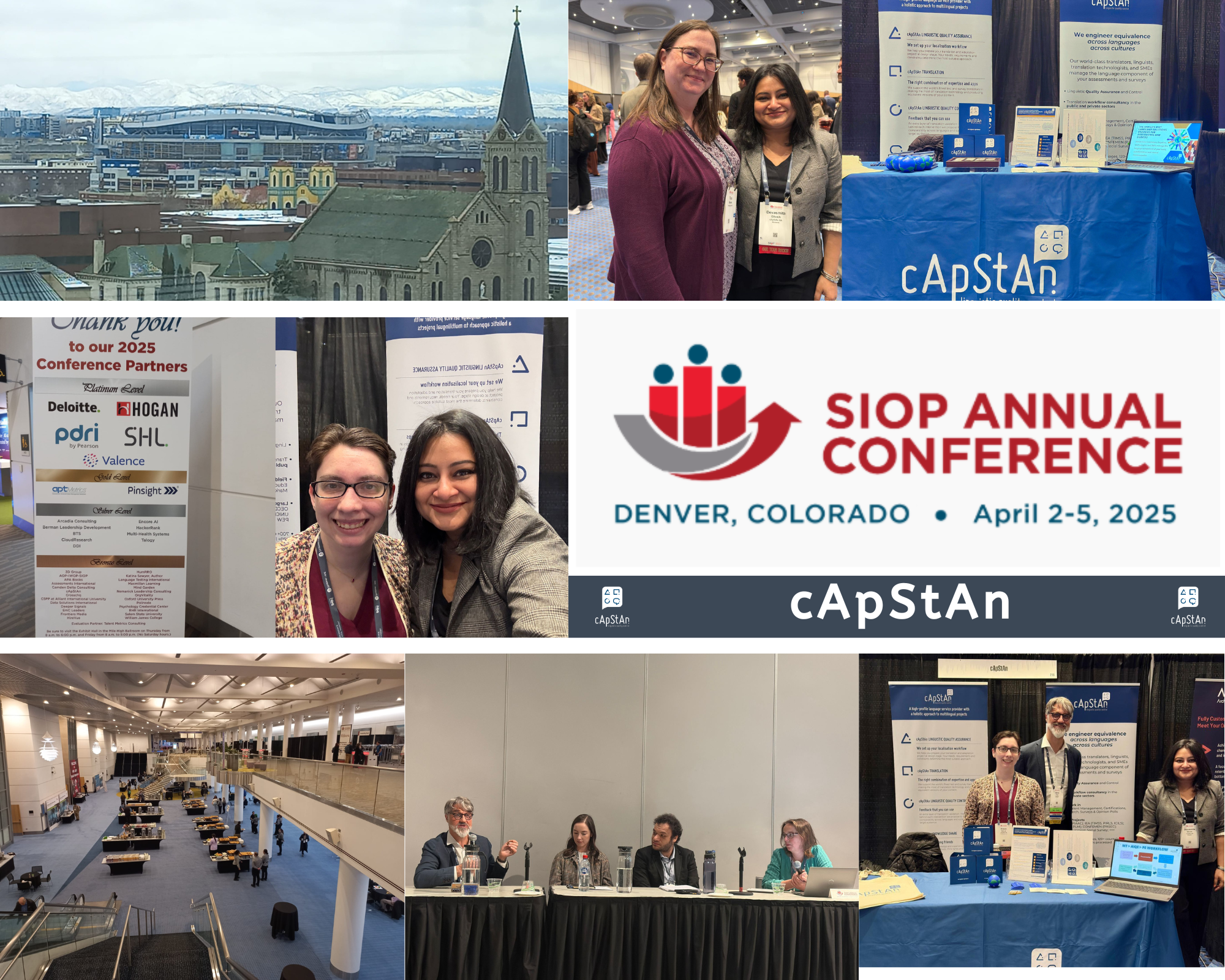
cApStAn at the 40th Annual SIOP Conference | April 2-5, 2025, Denver, Colorado, USA
Why would an assessment localization specialist spend 4 days with 4,000+ Industrial/organisational psychologists and be a Bronze-level Partner at their conference? Of course, we thought we had it all figured out when a cApStAn team of three flew out to Denver: Devasmita Ghosh, Grace DeLee and I looked forward to meeting the people who develop those psychometric tests that we adapt for use in different cultures and regions. We planned to answer questions about the impact of the use of AI on assessment localization. We were keen to showcase our new hybrid workflows that leverage both human expertise and cutting-edge technology. Steve was scheduled to discuss concrete use cases in a panel session, with industry leaders. We exceeded all these expectations by a mile (well yes, Denver is a mile high, so that makes good sense). What else?
There was more. Already at the Opening Reception, in the Bluebird Ballroom Foyer, while we stood with our plates of exquisite Mexican-style tacos, we were immersed in lively, meaningful conversations. There seemed to be a drive to cut the small talk short and ask hard questions about the future of work, of talent management, of diversity, equity and inclusion (DEI) and even of I-O psychology in a chaotic geopolitical landscape. The multinational groups that formed contributed to the diversity of perspectives. This set the stage for an unforgettable conference.
In American conferences, the day begins early, with a continental breakfast at 7:00 a.m. The first session I attended began at 8:00 and had an unusual format: five researchers or practitioners had selected popular I-O books, the type that executives like to read. They prepared thorough reviews, with a special focus on the extent to which the content aligns with science (and on understanding where C-Suite executives get their ideas). A refreshingly vivid, well-prepared reviews that made us want to read some of the books. In another panel, five highly successful and versatile presenters shared their respective (and very diverse) approaches to personal branding.
Our panel was scheduled at 10:30 a.m. and was well attended: it was the only session dedicated to localizing psychometric tests, and covered the gamut of approaches to understanding the linguistic features that drive the psychometric characteristics of test items: there was a short history of test localization, there were illustrative examples, and use cases that leverage state-of-the-art translation technology. Thank you, Gerianne, Alanah and Karim, for sharing the floor with me and making this panel so engaging.
The panels and workshops that followed were equally engaging. I was impressed with the discussion on concrete strategies to counter or mitigate anti-DEI legislation or policies. I recognised the independent, creative, considerate but firm Americans that I love, and was relieved to see that resistance is organised. No shunning of burning questions in this group. In yet another panel, the spotlight was on cultural competency, a concept that has been around for many years, as a relevant toolkit to continue promoting diversity, equity and inclusion under a name that will allow effective without falling prey to anti-DEI backlash. The spirited follow-up conversations that this ignited were music to my ears.
We have all heard a lot about generative AI, and I am biased in this respect, as I regard large language models as mere productivity tools: I favour presentations that provide practice-oriented use cases that do not rely on conversational exchanges with an interface but on ways to conduct research in scalable and reproducible ways. Two of the sessions I was lucky to attend – one panel and one symposium — offered exactly that. I learnt about building dynamic few shot examples, and how researchers conduct experiments to build RAG chatbots. The symposium, on the last day of the conference, compared the performance of large language models (LLMs) and humans in personnel selection and feedback summarization. Remarkably, each paper examined the reliability of the tools and showed where AI brings reproducible efficiencies and where human judgement is indispensable. These were not theoretical presentations but valid use cases – and the presenters recommended a wealth of literature for further reading.
I would be remiss if I didn’t mention the entertaining SIOP’s Got Talent show on Friday evening, organised by I-O Toastmasters Nikita Mikhailov and Georgi Yankov. There was poetry, a stand-up comedian who gave it first shot, singers, techno dance, and I-O jokes, of course. I was moved by the courage of the performers and by the way the spoken word and the music were used by many to express dismay about the erosion of checks and balances and call for resistance. I am immensely grateful for the emotion shared by intelligent people who have their hearts in the right place.
~ In the words of our Co-Founder Steve Dept